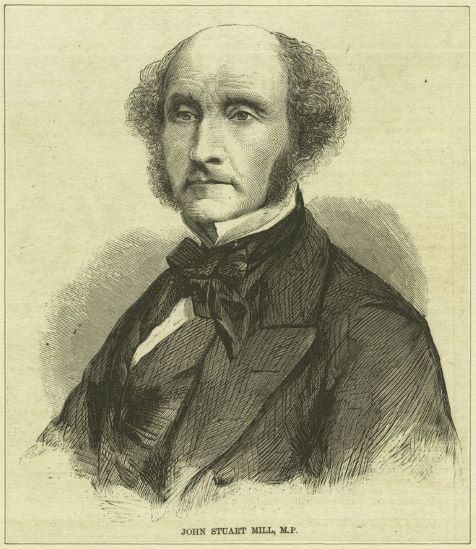Liberty Matters
John Stuart Mill on Human Nature, Self-interest, and Institutional Incentives
 John Stuart Mill is notorious among classical liberals for his famous distinction between the “laws” of production and the choices a society can make about the distribution of what has been produced. Production is determined by and limited to what physical laws will permit. But it is in the hands of the community, Mill argued, to determine how what has been produced is ladled out among the members of society.
John Stuart Mill is notorious among classical liberals for his famous distinction between the “laws” of production and the choices a society can make about the distribution of what has been produced. Production is determined by and limited to what physical laws will permit. But it is in the hands of the community, Mill argued, to determine how what has been produced is ladled out among the members of society.This lead prominent free market-liberals, like Ludwig von Mises and F. A. Hayek, to point out that due to Mill’s formulation of this distinction, as well as his numerous rationales and defenses of various interventionist welfare state-type policies in his Principles of Political Economy and other writings, it is justifiable to assert that Mill was one of the leading thinkers who influenced the trend away from the older “laissez-faire” liberalism to the more “social” liberalism of the modern Progressive and Social Democratic movements in America and Europe.
In a reconsideration of Mill’s wider contribution to political economy, however, it is important to point out that while he may have been sympathetic to the socialist hope and ideal that human nature may be transformable into a monastic brotherhood of collective sharing and selflessness, in the context of the world in which he lived and expected for the foreseeable future, this was not the case.
He took it for granted that individuals are guided by self-interest, that they act to improve their circumstances given how they define betterment, and that people respond in predictable ways to the incentive structures of the society in which they live.
Given the reality of human nature in the social world, Mill was insistent that, “though governments or nations have the power of deciding what institutions shall exist, they cannot arbitrarily determine how those institutions shall work.”[53] The effects from changing how wealth was distributed in society were not under man’s unlimited control through government edict, legislation or command. Or as he put it,
We have here to consider, not the causes, but the consequences, of the rules according to which wealth may be distributed. . . . Human beings can control their own acts, but not the consequences of their acts either to themselves or to others. Society can subject the distribution of wealth to whatever rules it thinks best; but what practical results will flow from the operation of those rules must be discovered, like any other physical or mental truths, by observation and reasoning.” [54]
He understood that the link between work and reward was strongest when the gains from effort were the property of the producer of wealth, and the resulting output might be negatively affected under prevailing human circumstances with a break in this linkage. Or has Mill expressed it, any policies or institutional changes that stood between an individual reaping the rewards of his own productive efforts tend “to make the aggregate productive powers of the community productive in a less degree than they would otherwise be.” [55]
Thus, in the reality of the world in which Mill lived and evaluated the economic policies around him, he was very far from being a mindless utopian in la-la-land who believed in an infinitely malleable human nature in which social reality could be whatever the dreamer of a “better world” might desire.
Endnotes
[53.] Principles, p. 21. Preliminary Remarks </titles/102#Mill_0223-02_223> .
[54.] Principles, p. 201. Book II: Distribution, Chap. I Property </titles/102#Mill_0223-02_500> .
[55.] Principles, p. 115. Book I: Production, Chap. VII On What Depends the Degree of Productiveness of Productive Agents </titles/102#Mill_0223-02_359>.
Copyright and Fair Use Statement
“Liberty Matters” is the copyright of Liberty Fund, Inc. This material is put on line to further the educational goals of Liberty Fund, Inc. These essays and responses may be quoted and otherwise used under “fair use” provisions for educational and academic purposes. To reprint these essays in course booklets requires the prior permission of Liberty Fund, Inc. Please contact oll@libertyfund.org if you have any questions.